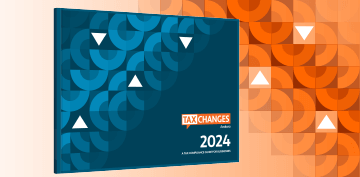
Shaken, stirred, and on the fence: States decide fate of cocktail-to-go laws
Alcohol-to-go laws in many states were a lifeline to restaurants and bars throughout the COVID-19 pandemic. Now that restrictions have lifted, states must decide whether to extend alcohol-to-go policies or allow them to expire. Their decisions can affect tax compliance for businesses in the industry.
New York closes and reopens lid on takeout cocktails
New York was the first state to allow bars and restaurants to make takeout and delivery alcohol sales. Then it was among the first to prohibit such sales after lifting restrictions on in-person dining and drinking. Nearly a year later, New York reinstated to-go and delivery privileges for alcohol on a temporary basis.
Here’s the timeline:
New York permitted on-premises licensees to make takeout and delivery sales of liquor and wine March 16, 2020, through June 24, 2021.
New York prohibited on-premises licensees from making takeout and delivery sales of liquor and wine June 24, 2021, through April 10, 2022.
New York permitted on-premises licensees to make takeout and delivery sales of liquor and wine starting April 11, 2022.
On-premises licensees will no longer be permitted to make takeout and delivery sales of liquor and wine as of April 9, 2025 — unless the law changes.
Restaurants and bars were permitted to sell beer for delivery and takeout prior to the pandemic, and they still can.
Governor Kathy Hochul supports allowing bars and restaurants to sell alcoholic beverages to go, so we’ll likely see more developments on this front.
Which states allow alcohol-to-go sales on a permanent basis?
In June 2020, Iowa became the first state to permanently authorize delivery and to-go sales of alcohol. Other states have followed Iowa’s lead. States where delivery and takeout sales of alcohol are permanently allowed include:
Different rules and regulations may apply in different states. For example, the purchase price of delivered beer and wine may not exceed the purchase price of food in Montana, while alcohol delivery and pickup sales may be prohibited if the retailer is too close to a school in Georgia.
Pennsylvania doesn’t allow takeout or delivery of spirits, but certain restaurant and bar licensees can sell beer for off-premises consumption, and businesses with a Wine Expanded Permit can sell up to four 750 mL bottles of wine to go in Pennsylvania.
Which states allow alcohol delivery temporarily?
Numerous states allow delivery and takeout sales of alcohol for now but aren’t ready to make the policy permanent. These include the following (listed with the date the allowance is set to expire):
|
December 31, 2026 |
April 1, 2024 |
April 9, 2025 |
|
July 1, 2025 |
December 31, 2026 |
July 1, 2025 |
|
August 1, 2028 |
TBD |
July 1, 2024 |
Maryland and Tennessee will no longer allow carryout sales of alcoholic beverages as of June 30, 2023.
As above, regulations and requirements vary from state to state.
Which states don’t allow alcohol delivery and to-go sales?
States that don’t currently permit bars or restaurants to sell alcohol to go include:
- Idaho
- Maryland (effective July 1, 2023)
- Minnesota
- North Carolina
- North Dakota
- Pennsylvania (some licensees may sell beer to go, but Pennsylvania prohibits to-go sales of spirits and individual servings of wine)
- South Carolina: Cocktails containing liquor cannot be sold to go, though bills seeking to authorize curbside pickup or delivery of beer and wine have been introduced; certain licensees may sell wine or beer for off-premises consumption
- South Dakota
- Tennessee (effective July 1, 2023)
- Utah
- Wyoming
In many of the above states, pressure is building to legalize takeout and delivery sales of beer, wine, and cocktails.
Alcohol delivery policies complicate tax compliance
One issue facing states as they establish or extend alcohol-to-go policies is whether (or to what extent) to allow third parties to deliver alcohol on behalf of licensed sellers.
For example: Arizona has authorized the use of registered alcohol delivery contractors; Iowa and New Jersey now permit third-party delivery providers to deliver alcoholic liquor, wine, or beer on behalf of a licensee or permittee; Louisiana allows alcohol retailers to contract with a third-party delivery company or third-party platform provider; and Texas permits third-party food delivery services to deliver certain alcoholic beverages as of January 1, 2022.
However, third-party delivery isn’t allowed in Oklahoma, and third-party delivery services cannot deliver to-go cocktails in Illinois.
These and other policies related to alcohol delivery and takeout sales may change as states develop and refine them. In trying to balance the often-conflicting preferences and concerns of consumers, legislators, and businesses in the industry, tax compliance is sometimes overlooked. It won’t be for long.
For more information about the multiple issues surrounding alcohol marketplaces, and more, check out this blog series. Our 2023 sales tax changes report offers additional insights.
This post was updated June 26, 2023; it originally published July 20, 2021.

Avalara Tax Changes 2024: Get your copy now
Stay ahead of 2024’s biggest tax changes with this comprehensive, compelling report covering seven industries.
Stay up to date
Sign up for our free newsletter and stay up to date with the latest tax news.












